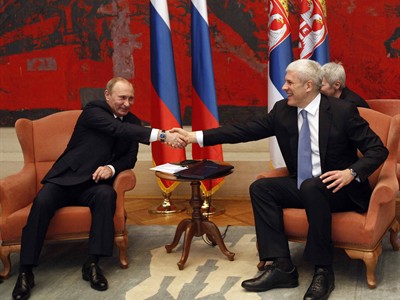
South Stream as Kremlin’s Geopolitical Tool
Publication: Eurasia Daily Monitor Volume: 9 Issue: 199
By:

Russia is moving rapidly to start building the South Stream natural gas pipeline before the end of the year. On October 29, Serbia became the first Gazprom partner to announce its final investment decision on the construction of South Stream. Bulgaria will follow suit on November 9; Hungary and Slovenia are expected to adopt similar decisions by November 15 (Beta, Tanjug, Mediapool.bg, October 29).
The flurry of activities on finalizing South Stream investment agreements with a number of Central and Eastern European countries will permit Gazprom to start construction soon. After Turkey signed a deal in December 2011 to let Russia run the pipeline through Turkish territorial waters in the Black Sea, the Kremlin seems to be getting closer to achieving two major political goals: bypassing Ukraine in future Russian gas supplies to Europe and getting ahead of the Nabucco project (or any modification of it) designed to transport Caspian gas via Turkey.
Before commissioning its North Stream pipeline under the Baltic Sea to deliver gas directly to Germany in November 2011, Russia was shipping around 80 percent of its Europe-bound gas via Ukraine—and the rest via Belarus. In 2011, Russian gas exports to Europe, including Turkey, totaled 140 bcm (BP Statistical Review, June 2012). The combined maximum capacity of the North Stream (55 bcm), South Stream (63 bcm) and Blue Stream pipeline (delivering 16 bcm Russian gas to Turkey under the Black Sea) will almost match this figure, thus changing completely Russia’s export routes. But for European Union customers, the diversification of routes does not equal the diversification of sources. In addition, the exclusion of Ukraine from international gas transit corridors will make it more vulnerable to political pressure and energy blackmail by Moscow.
Gazprom owns 50 percent of the South Stream project, Italy’s ENI has 20 percent, and Germany’s Wintershall and Electricite de France (EDF) each own 15 percent. Hence, the Russian energy giant is taking the lead in negotiating separate bilateral agreements with each state along the South Stream route. Gazprom is attempting to retain full control of the project, a process that has raised concerns in Brussels. The EU Energy Commissioner Guenter Oettinger called a ministerial meeting on the South Stream project in Brussels on October 29 with the participation of officials from Bulgaria, Croatia, Greece, Hungary, Italy, Slovenia, Austria and Romania. The meeting revolved around whether the countries through which the South Stream pipeline would pass will agree to accept the European Commission’s coordinating efforts. The EU wants to ensure that possible bilateral agreements, which may be signed by certain EU member states, are fully adjusted to common European legislation, the EU acquis communautaire (Hina, Bulgarian National Television, October 29).
South Stream Serbia, a Switzerland-registered joint venture between Gazprom and Serbia’s state gas utility Serbijagas, will invest 1.7 billion euros ($2.2 billion) in the project. The 470-killometer (292-mile) long Serbian section of the pipeline will start at the Bulgarian border in the east and exit near Subotica in the north. It will then continue through Hungary to Austria, with offshoots to Croatia and Bosnia-Herzegovina (the Republika Srpska entity only). Another branch will veer through Slovenia and reach northern Italy.
The South Stream project may include links to Macedonia and Montenegro, according to Serbijagas CEO Dusan Bajatovic, who spoke at a press conference in Belgrade after signing the definitive agreement with Gazprom (Beta, Tanjug, October 29). However, neither Bajatovic nor his Gazprom counterpart Leonid Chugunov mentioned the possibility of connecting Kosovo or Albania to the grid. Both countries have so far been excluded from the Gazprom-sponsored Balkan network. This is not surprising given Belgrade’s refusal to recognize Kosovo and Moscow’s propensity for accommodating its loyalists. The new Serbian President Tomislav Nikolic, a vocal advocate of improved relations with Russia, went to Sochi in September to meet with Russian President Vladimir Putin and announce that the construction of Serbia’s South Stream section will begin in December 2012 (kremlin.ru, Tanjug, September 11).
Unlike other bilateral agreements in the Balkans, where the shareholders have 50/50 ownership of the joint companies, Serbijagas has agreed to a 49 percent share while Gazprom has 51 percent. This may become a problem when Serbia joins the European Union, because a non-EU member state will be the majority owner of a critical energy corridor on EU territory.
Gazprom does not seem to be currently pushing for the initially planned southern branch of South Stream, which was supposed to run from Bulgaria through Greece to southern Italy. The Russian energy giant seems to be focused on meeting its self-imposed deadline to start building the main route from the Black Sea city of Varna to Vienna in December.
Moscow is in a hurry to start constructing the pipeline before the EU’s Third Energy Package becomes effective in March 2013. The new regulations would require providing access by other EU suppliers to pipelines built by third countries, such as Russia. However, European Commission sources have said that attempts to accelerate the South Stream project will not circumvent EU antitrust and environmental obligations (EurActiv, October 30). Commission officials told EurActiv that the electricity and gas directives, the two key pieces of the package, had to be transposed by EU countries by March 3, 2011, and were therefore already considered to be in force. In fact, the European Commission believes that Bulgaria and Romania are still not fully in line with EU gas market rules and took the two countries to the EU Court of Justice in November 2011 (European Commission Press Release, November 24, 2011).
Although not openly opposing South Stream, the EU’s priority remains the Nabucco natural gas pipeline (or its re-embodiment, the Southern Gas Corridor) from the Caspian Sea via Turkey to Europe. According to a recently leaked report by the European Commission, Bulgaria must commit more thoroughly to the development of the EU-supported Southern Gas Corridor aimed at diversifying natural gas supplies to Europe (novinite.com, EurActiv, September 18). Bulgaria will be the second state formally committed to South Stream. On November 9, Gazprom’s Deputy Chairman Alexei Miller will arrive in Sofia to sign the final investment agreement with Mihail Andonov, executive director of Bulgarian Energy Holding. Russia’s President Vladimir Putin will not be present at the ceremony, as he has postponed his visit to Sofia until December, according to the Bulgarian Foreign Ministry (Dnevnik, Mediapool.bg, October 30).




